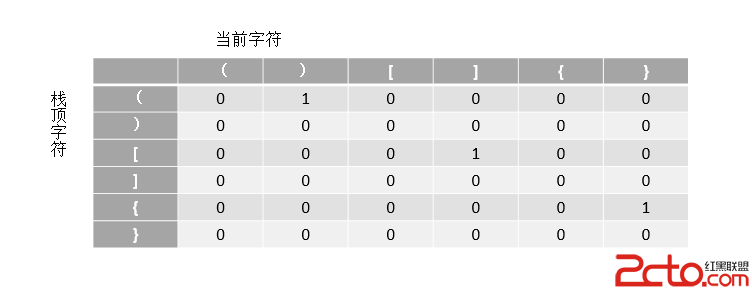Q:Given a string containing just the characters '(', ')', '{', '}', '[' and ']', determine if the input string is valid.
The brackets must close in the correct order, "()" and "()[]{}" are all valid but "(]" and "([)]" are not.
這道題是括號匹配問題,考察的是棧的基本使用。
我定義了一個括弧的優先級表,若當前字符優先級大於棧頂字符(1),則彈出棧頂字符;若當前字符優先級小於棧頂字符(0),則當前字符入棧。最後觀察棧是否為空,若為空,則括弧配對,否則不配對。優先級表如下圖:

下面貼上代碼:
#include#include using namespace std; class Solution { public: int replace(char c){ if (c == '(') return 0; if (c == ')') return 1; if (c == '[') return 2; if (c == ']') return 3; if (c == '{') return 4; if (c == '}') return 5; } bool isValid(string s) { if (s.length() == 0 || s.length() == 1) return false; int ch[6][6] = { { 0, 1, 0, 0, 0, 0 }, { 0, 0, 0, 0, 0, 0 }, { 0, 0, 0, 1, 0, 0 }, { 0, 0, 0, 0, 0, 0 }, { 0, 0, 0, 0, 0, 1 }, { 0, 0, 0, 0, 0, 0 } }; stack ss; for (int i = 0; i < s.length(); i++){ if (ss.empty()){ ss.push(s[i]); continue; } char c = ss.top(); if (ch[replace(c)][replace(s[i])]) ss.pop(); else ss.push(s[i]); } if (ss.empty()) return true; else return false; } }; int main() { Solution s; cout << s.isValid("()[]{}()") << endl; cout << s.isValid("(([]{}))") << endl; cout << s.isValid("([]}") << endl; return 0; }